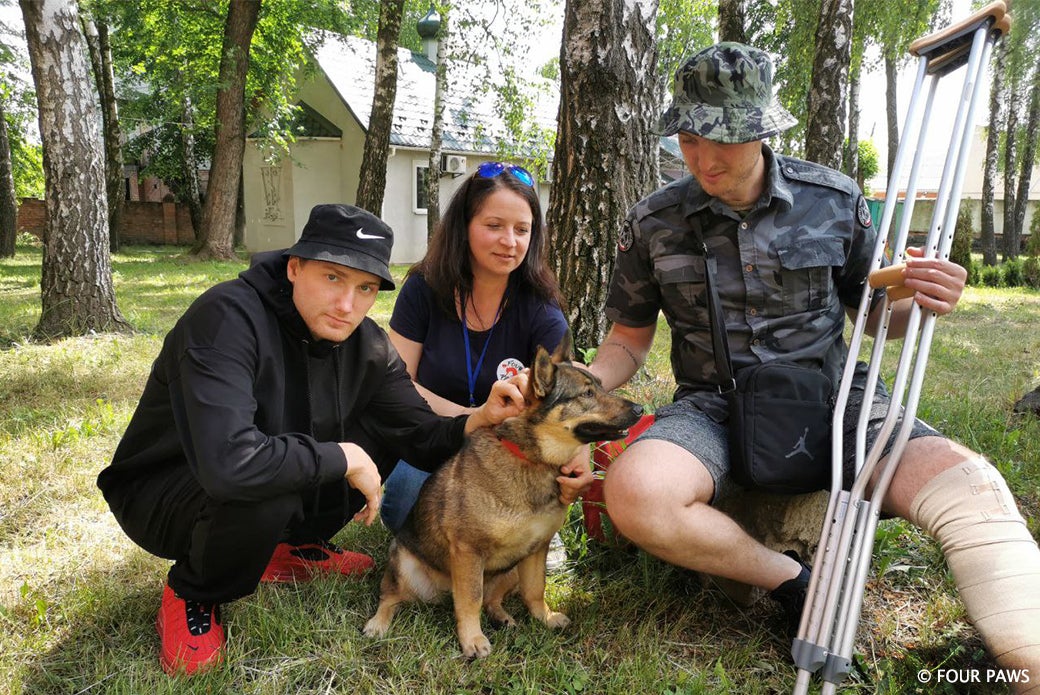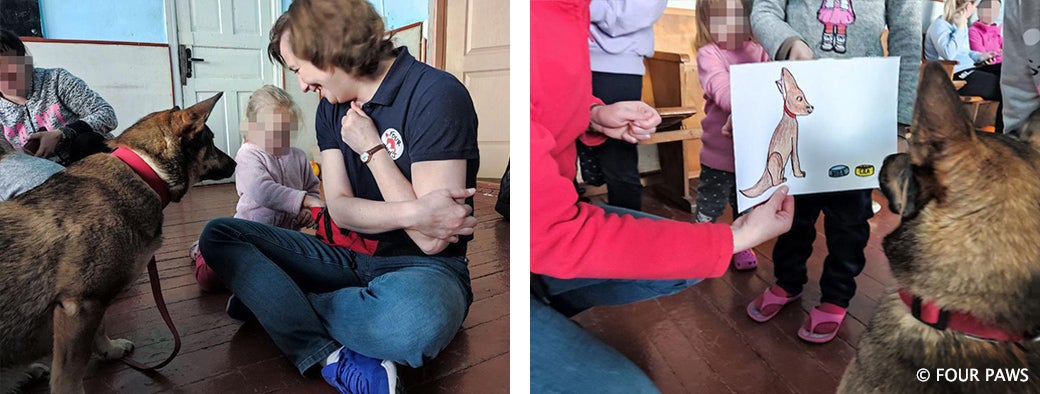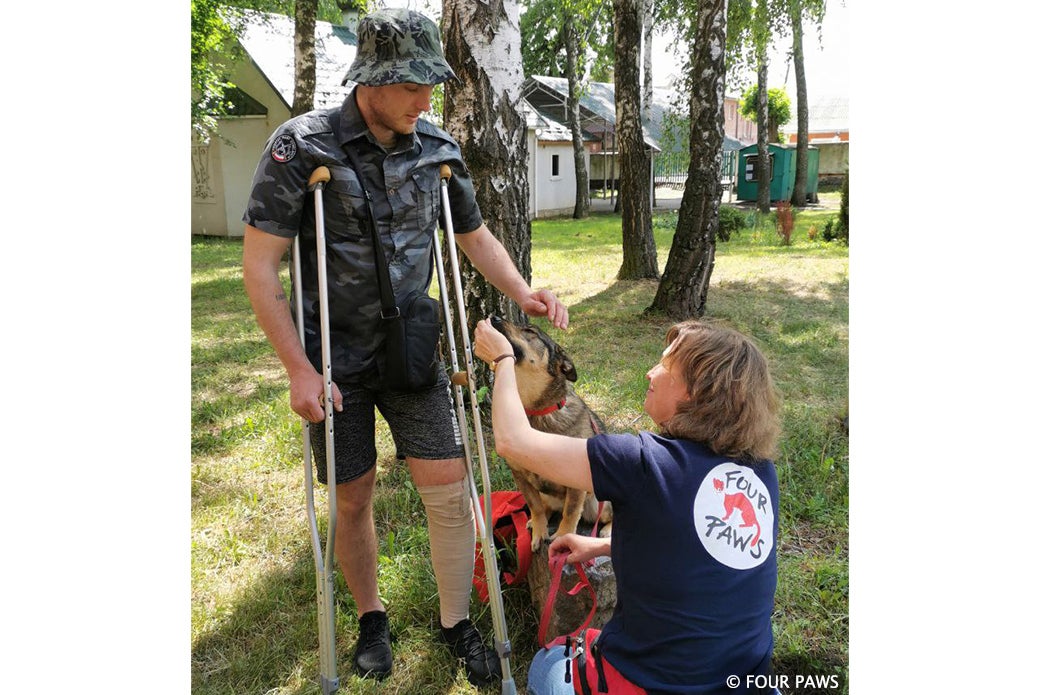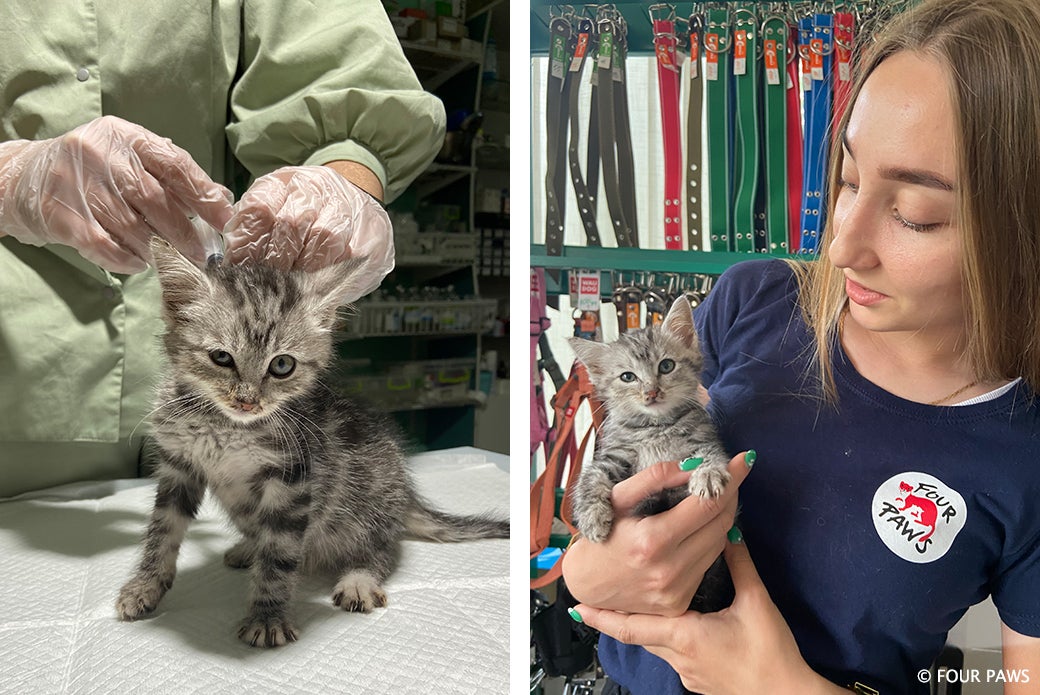

Shortly after Russia attacked Ukraine in February, the ASPCA provided $150,000 in grant funding to five organizations offering emergency assistance to Ukrainian animals and owners in Ukraine, including FOUR PAWS USA.
FOUR PAWS has applied some of these funds toward Animal Assisted Intervention sessions with refugees and soldiers, healing abandoned animals that would otherwise have died, and establishing the Povidok Project, a tagging program that helps identify lost pets during emergencies.
Busia: From Stray Dog to Therapy Dog
Amid a worsening humanitarian and animal welfare crisis in Ukraine, FOUR PAWS’ dedicated team continues to support people and animals.
FOUR PAWS’ Animal Assisted Intervention and Stray Animal Care teams are currently based in Vinnytsia, Ukraine, where large numbers of refugees have come to flee the worst-hit areas, including Chernihiv, Mariupol and Kharkiv.


Busia, a therapy dog, is a former stray who works with her handler, Nataliia Sorokina, and Practical Psychologist Viktoriia Habryk on FOUR PAWS’ Animal Assisted Intervention (AAI) team. Since April, the AAI team has conducted over 70 sessions with children in refugee camps, reaching over 450 refugees. They have also provided therapy sessions for recovering Ukrainian soldiers.
“Busia has an important role in helping humans,” says Keira Haley, FOUR PAWS USA’s Director of Development. “When families arrived at train stations, Busia and Nataliia were there to offer immediate support. Most of the children arrived from Mariupol and Kharkiv, traveling for over 15 hours and witnessing the horrors and devastation of war firsthand. Seeing and spending time with Busia improves their mood greatly. Busia’s presence also helped change people’s attitudes and perspectives about strays.”


“Busia helps adults and kids relax and boosts morale,” Keira adds. “She is crucial in providing emotional support and PTSD prevention to servicemen of the Armed Forces of Ukraine who were injured and recovered in the hospital in Vinnytsia.
To help children better express their feelings, the team asks them to draw pictures of dogs.
“It was fascinating to see how all the children drew doghouses with food and water bowls, saying that these are the things dogs needed most,” explains Keira.


Parents also benefited from this exercise, sharing stories of their pets who were left behind.
“Our team reported that the hardest part of their work in Ukraine was not only the large numbers of people and animals in need,” Keira says, “but prioritizing the health and welfare of our therapy dogs and not exceeding their recommended working time despite the demand.
“Busia’s licking a soldier’s hand or touching them with her paw gets them to relax and encourages their interaction with therapists,” adds Keira. “Most important, Busia does not judge. Instead, she brings unconditional love and comfort.”


Hope from A Tiny Kitten
Abandoned in the heart of the Uman, Cherkassy region of central Ukraine, a tiny kitten was discovered by a grocery store vendor who contacted FOUR PAWS’ staff. Kate Klymenko, FOUR PAWS’ veterinary assistant, took the kitten, whom she named Hope, to a local clinic for an exam, where she received a devastating diagnosis: an infectious brain lesion.


“The poor kitten walked in circles with her head constantly turned to the right,” says Manuela Rowlings, head of Stray Animal Care Europe—one of FOUR PAWS’ critical programs. “She could not eat on her own and needed constant supervision. Veterinarians did not think she would survive.”
Undaunted, Kate administered Hope’s medication daily. Slowly, the kitten started to recover, moving freely and eating on her own. In September, she was adopted and continues to flourish.
“Hope’s story of beating the odds reminds us that good things are possible, even in the darkest times,” Manuela says.
The Povidok Project
Thousands of pets have been reported missing in Ukraine since the war began.
FOUR PAWS and Animal ID established the Povidok Project to prevent pets from getting lost during an emergency.


Before the war, pet identification was not popular in the country, and few animals had microchips, making it nearly impossible to reunite many dogs and cats with their families.
“Povidok means ‘collar’ in Ukrainian, and this endeavor aims to tag dogs and cats and register them in a particular pet care app, free of charge,” says Manuela. “The QR ID tag—a small token—can be clipped onto a pet’s collar or harness.”
FOUR PAWS and Animal ID distributed 20,000 QR ID tags for free through a network of shops, even in very remote areas. Owners register with a database; if the pet gets lost, their finder can scan the code with their phone and directly reunite the lost pet with its owner.
“We understand that microchips have one distinct advantage over a QR ID tag—they are permanent and cannot be lost or removed,” Manuala says.
“But they can only be implanted by a veterinarian, and most people in rural areas do not have easy access to veterinarians in these difficult times.”
FOUR PAWS and other organizations committing to support people and pets in Ukraine are proof that humanity can surface even among the most brutal of circumstances. But they still need all the help they can get.
“While wars are scenes of catastrophic violence, they can also inspire moments of incredible compassion through heroic actions of organizations, individuals, and even animals,” says the ASPCA’s CEO Matt Bershadker. “The ASPCA is proud to join the community of support for critical animal rescue work in Ukraine.”
Source: Read Full Article



